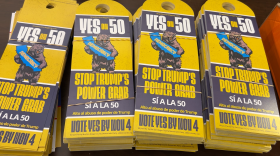RENEE MONTAGNE, host:
President Bush today signs legislation that extends the 1965 Voting Rights Act for another 25 years. The act is considered by many to be the lynchpin of U.S. civil rights law. The renewal bill ran into strong resistance from southern Republicans, and in an unusual move, some prominent corporate leaders weighed in to support it.
NPR's Peter Overby reports.
PETER OVERBY reporting:
The first corporation to call for a renewal of the Voting Rights Act was Wal-Mart. Lee Culpepper is the company's vice president for federal relations.
Mr. LEE CULPEPPER (Wal-Mart): Wal-Mart is the largest private employer of African-Americans and Hispanic Americans, but we also have a great number of our customers who are African-Americans and Hispanic Americans. So we have a great interest in the issue on behalf of both our associates, our workers, and also our customers.
OVERBY: Wal-Mart regularly battles with liberal lawmakers over union organizing, healthcare and other issues. But its executives met with the Congressional Black Caucus in early 2005. The result?
Mr. CULPEPPER: In June of last year, the Wal-Mart CEO, Lee Scott, sent a letter to President Bush urging him to support an extension of the Voting Rights Act.
OVERBY: The crunch came this summer when conservative Southern lawmakers pushed amendments to weaken the bill. The bill's supporters used the Wal-Mart letter as a model and reached out to other companies. Les Moonves, president of CBS, wrote to congressional leaders. Martin Franks, an executive vice president at CBS, quotes from the letter about what it calls the cornerstone of American society.
Mr. MARTIN FRANKS (CBS): The utterly free flow of ideas that is the hallmark of our daily lives, a free flow that is made possible by our own common right to express our views at the ballot box. That's why we wrote the letter.
OVERBY: At Eli Lilly in Indianapolis, spokesman Ed Sagebiel says they wanted to add a voice from the heartland. He calls it a unique situation.
Mr. ED SAGEBIEL (Spokesman, Eli Lilly): In most instances, when we lobby up on Capitol Hill, we are lobbying for broader healthcare issues, or industry/pharmaceutical issues that may impact our company. And we saw this as an opportunity to be a leader on this, and did so because we believe in the legislation. We think that it has contributed to monumental and dramatic changes in American society.
OVERBY: There was also a letter from Pfizer CEO Henry McKinnell, writing as chairman of the Business Roundtable. That's a group of CEOs of some 160 major companies. Tom Lehner is the group's public policy director.
Mr. TOM LEHNER (Director of Public Policy, Business Roundtable): You know, our main purpose is to promote economic growth. But one of the, you know, I think, fundamental tenets is equal participation in both the economy and the political process.
OVERBY: Letters also came from CEOs at AT&T, Coca-Cola, Walt Disney, ten companies in all. A senior aide to one Democratic lawmaker said that just one company said no. Its executives said they feared retaliation on other legislation in the hardball atmosphere that now pervades Congress. The aide wouldn't identify the company or himself, citing the Capitol Hill tradition that staffers don't upstage members.
Democratic Congressman John Lewis of Georgia, a civil rights veteran, says he's never seen anything like this from U.S. corporations before. And he says minority voters will remember it.
Representative JOHN LEWIS (Democrat, Georgia): The words tend to spread very fast in minority communities. To see in those ethnic publications that several major American corporations supported the reauthorization of the Voting Rights Act, that gives them a leg up.
OVERBY: And if there's any blowback from critics of the legislation, the corporations say they have yet to see it.
Peter Overby, NPR News, Washington. Transcript provided by NPR, Copyright NPR.





